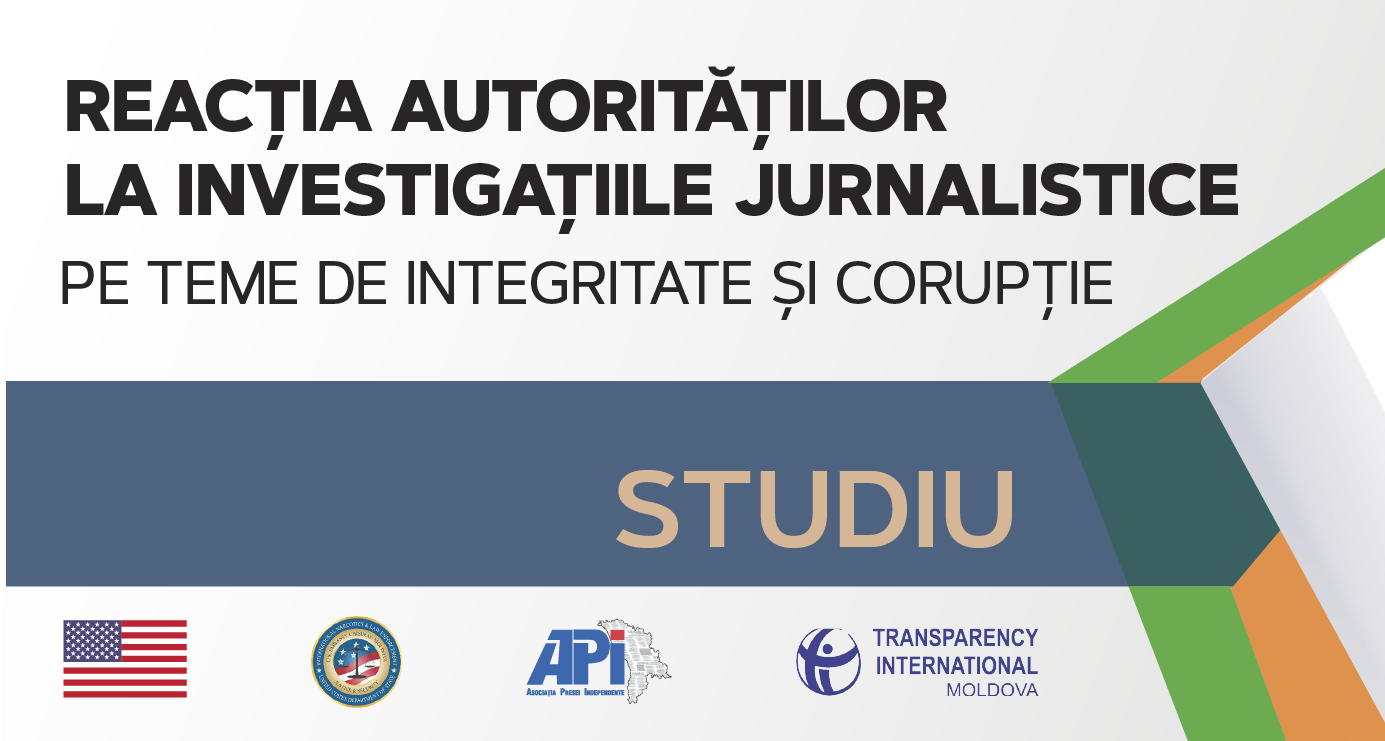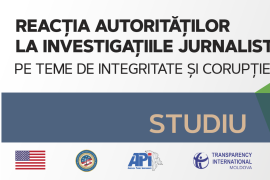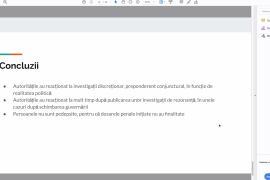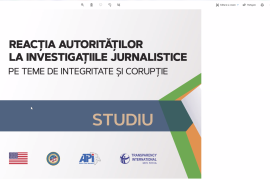back
Study. How do Authorities React to Investigative Reports on Integrity and Corruption?

Well-documented investigative reports are regularly published in the Moldovan media about the assets that by far exceed the incomes declared by the politicians and officials, about conflicts of interest and non-transparent or rigged procurement competitions, and about other corruption schemes. In some cases, the public institutions in the field of the fight against corruption reacted to the reports and initiated control procedures, but in others no reaction followed or the reaction was discretionary and conjunctural, depending on the political reality. These are some of the conclusions of the study „Authorities’ Reactions to Investigative Reports on Integrity and Corruption,” launched on 5 May 2021 as part of an online event, organized by the Association of Independent Press (API) and Transparency International Moldova.
The authors of the investigative reports – journalists Viorica Zaharia and Victor Moșneag, looked at how the anti-corruption authorities reacted to the facts described in 19 professional investigative reports on corruption and integrity, and the study also contains a retrospective of the authorities' reaction to 10 such reports published in the last five years, targeting key people in public institutions who have committed illegal or arguably legitimate acts.
„What's the use of you writing, if nothing followed...?”
„In society, there is a perception that journalists write good investigative reports and nothing happens afterwards,” Viorica Zaharia said at the beginning of the presentation, adding that such perceptions are confirmed by the conclusions of the study. „The state institutions’ failure to react or formal reactions to what the investigative media write, they discredit themselves before the society, and to a certain extent, this also discredits investigative journalism. Or, we often hear reactions such as: what is the use of you writing, if nothing has followed; the man keeps on working and is even promoted...? We hope that these studies will help put more pressure on the authorities to pay more attention to the media reports concerning conflicts of interest, procurement tenders, assets that exceed the incomes declared etc.,” the author of the study noted.
After monitoring the reactions to 19 investigations on corruption and integrity issues, published between August 2019 and December 2020 by the Center for Journalistic Investigations, Ziarul de Gardă, RISE Moldova and MoldovaCurata.md, the study authors found greater readiness than in previous periods by the National Integrity Authority (NIA) to check and initiate controls based on media investigative reports. Reactions followed in all the cases monitored, either NIA took action, or other state institutions reacted. However, the effectiveness of such controls cannot be assessed yet, as most of them are still ongoing. Three of the officials targeted in the investigations became subjects of criminal cases, but only one for the facts described in the report, after a complaint filed by a third party. Only one resignation followed the investigative reports, on grounds that included the facts described in the report, but it happened only after other state institutions started controls (Oleg Ogor, former vice president of Criuleni district).
After reviewing 10 resonant investigative reports, published in the last five years, journalist Victor Moșneag, the second author of the study, concluded, „The authorities do not react after the publication of investigations targeting people affiliated with the government. In some cases, the reaction appears only after the change of government. They have reacted to investigations about judges, prosecutors or other important people only when such people have become hostile to the government and were ‘sacrificed’. For the most part, the criminal cases started have had no outcomes, and we do not have persons sanctioned for the violations and illegalities committed.”
The study found that anti-corruption authorities reacted discretionarily to investigative reports, mostly conjuncturally, depending on the political reality. In many cases (Judges Melniciuc and Sternioală), criminal cases based on information from media reports were started only after changes took place at the political level. In the case of former Democratic Party President Vladimir Plahotniuc, the information in the investigations was confirmed almost a year after the politician fled the country and his party lost the governance. It is extremely rare for people responsible for mismanagement of public money or alienation of public assets to go to court and material damage is not recovered. An exception is the return to state ownership of illegally privatized buildings, including the former government canteen, but in other cases, including the construction of the sports complex in Rezina, for which 13 million lei were spent without any purpose, the funds have not been recovered and no steps have been taken in this regard, and the persons with positions of responsibility that allowed the waste of public money have not been sanctioned.
The study contains a number of recommendations for state institutions, including those with criminal investigation functions, for political parties and blocs, non-governmental organizations and journalists, to ensure operational and appropriate reactions to the facts described in professional investigative reports.
Investigative journalists and employees of anti-corruption structures must be on the same side of the ‘barricade’
The public event for the presentation of the study was attended by over 40 people, including journalists, anti-corruption experts, representatives of anti-corruption institutions, and other stakeholders.
Cornelia Cozonac from the Center for Journalistic Investigations, Vladimir Thoric from RISE Moldova and Liuba Șevciuc from the Cu Sens team, reported on the experience after the publication of the investigations, including on the selective reactions of the authorities, but also on the insufficient tools for verifying the assets abroad of persons from the Republic of Moldova suspected of corruption. It is unfortunate that, instead of appropriate reactions from the authorities, in some cases investigative journalists are intimidated by lawsuits filed by the subjects concerned in the media reports.
Eduard Varzar, Deputy Chief Prosecutor of the Anticorruption Prosecutor's Office: „Certainly, the work that investigative journalists do is important, even if the reactions of the authorities are not the expected ones. However, things are changing and the authorities have become more responsive, as your study shows. When we talk about the collaboration of investigative bodies with journalists, we must also take into account the specific aspects of the criminal investigation technique, based on certain high standards of evidence. I do not generalize, but sometimes there are negative experiences left by other journalists who write upon order, which stains honest journalists.”
Ion Pruteanu, Head of the Anticorruption Education Department, National Anticorruption Center (NAC): „The quality of investigative reports is paramount, which is why it would be great for journalists to collaborate directly with the competent bodies until the information is made public. The authorities' reactions are delayed because the NAC also has certain tools to investigate this information. Closer collaboration would be beneficial for both parties."
The event was also attended by Alina Munteanu, Chief Inspector at the Integrity Inspectorate, and Viorel Sochircă, Head of the Department for Evaluation, Prevention and Implementation of NIA Policies, who referred to various aspects of the interaction with investigative journalists, and Radu Botezatu, Head of the International Cooperation Unit within the Agency for the Recovery of Criminal Assets, who spoke about the specifics of the agency’s work.
Kevin Lanigan, Senior Justice Adviser at the US Embassy to Moldova, Criminal Justice and Law Enforcement Department, and former prosecutor in Arizona, brought some examples from American practice when prosecutors investigated corruption cases after media investigative reports. „I have not seen a study of this kind in the USA, which would make the connection between investigative journalism and the actions of the anti-corruption authorities, and I appreciate this important achievement. I am a former prosecutor and we have investigated cases of corruption and abuse of office that have come to our attention through media reports. Investigative journalism, no matter what country we are talking about, the USA or the Republic of Moldova, must be good everywhere, and in a sound environment, investigative journalism can be a very important tool for law enforcement and other anti-corruption actors,” K. Lanigan said, recounting also about the specifics of the American legal system.
At the end of the event, Lilia Carasciuc, Executive Director of Transparency International Moldova, noted the need for such research to put pressure on the authorities, for prompt reactions to follow, which would comply with the stated intentions to fight corruption. And Petru Macovei, API's Executive Director, noted that the most important thing was for the process of documenting good investigative reports, which takes a long time, nerves, stress and not little money, to have the finality everyone expects, and namely, that corrupt people should be punished as they deserved.
The study „Authorities’ Reactions to Investigative Reports on Integrity and Corruption” can be downloaded (in Romanian) on the websites of the Association of Independent Press (API) and Transparency International Moldova.
The video recording from the launching event can be seen HERE.
The study was developed with the support of the Criminal Justice and Law Enforcement Department of the United States Embassy in Chisinau. The responsibility for the content belongs to the authors, and the opinions expressed herein may not correspond to the opinions of the donor, of Transparency International Moldova or of the Association of Independent Press (API).


